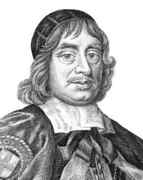Person: Ward, Seth

Seth Ward was an English mathematician and astronomer and a founder-member of the Royal Society.
Mathematical Profile (Excerpt):
- He was tutored by Samuel Ward, who was not a relation, and lodged in his lodgings.
- After disputing the differences between the Julian and Gregorian calendars, he was awarded his BA in 1637.
- When he returned to Cambridge, Ward introduced ideas from Oughtred's Clavis Mathematicae (1631) into the syllabus there.
- The First English Civil War began in 1642, before Ward was appointed to his lectureship.
- Ward opposed the Solemn League and Covenant and as a result he was removed from his fellowship and lectureship by the Parliamentarian Commissioners in 1644.
- Ward was able to hold positions again and was now in favour with the Parliamentarians having signed allegiance to the Commonwealth.
- However, Greaves was a friend of Ward and, before leaving office, was able to organise that Ward succeed him.
- The same Commissioners who dismissed Greaves appointed John Wilkins as warden of Wadham College, and Wilkins invited Ward to live in rooms in Wadham.
- Ward set up an observatory at Wadham and was the first person at Oxford to teach the Copernican system.
- These men constituted a brilliant intellectual group and they, together with Ward and others, formed the Oxford Philosophical Society.
- The library Ward refers to in this letter is the Bodleian Library which had been founded in 1598.
- In addition to his work in astronomy, Ward wrote several mathematical works, in particular Idea trigonometriae demonstratae (1654), but he is perhaps best known for his defence of the teaching at Oxford.
- Ward, in collaboration with John Wilkins, replied to Webster in Vindiciae Academiarum (1654).
- It was not only with Webster that Ward disputed.
- On the astronomy side Ward disputed with Ismael Boulliau in what has become known as the Boulliau-Ward controversy over Kepler's laws.
- Ward opposed Boulliau's assumptions, methods and conclusions.
- Ward was awarded a divinity degree from Oxford in 1654.
- Wren was Ward's successor as Savilian professor at Oxford.
- Bishop Ward was translated to Salisbury in 1667 where he also set about repairs necessitated by the disorders of the Civil War.
- A survey of the entire Cathedral at Salisbury was made at Bishop Ward's request to Sir Christopher Wren, principally with a view to the security of the spire.
- Bishop Ward's learning was considerable, his charity and hospitality very great.
- Bishop Ward was buried in his own Cathedral at Salisbury, where a tablet to his memory exists in the south transept.
Born 1 April 1617, Aspenden, Hertfordshire, England. Died 6 January 1689, London, England.
View full biography at MacTutor
Tags relevant for this person:
Astronomy, Origin England
Thank you to the contributors under CC BY-SA 4.0! 

- Github:
-

- non-Github:
- @J-J-O'Connor
- @E-F-Robertson
References
Adapted from other CC BY-SA 4.0 Sources:
- O’Connor, John J; Robertson, Edmund F: MacTutor History of Mathematics Archive
